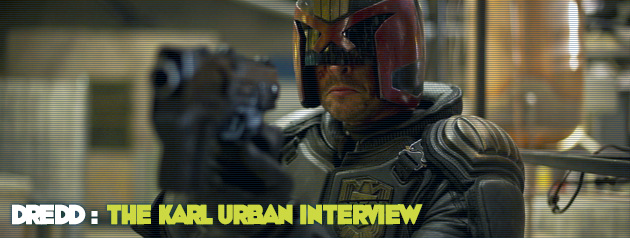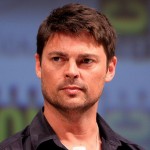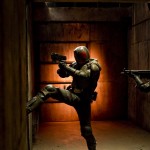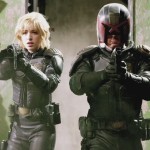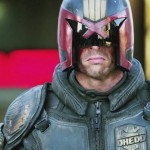With the brand new Judge Dredd movie – DREDD – being released across the UK tomorrow (7th Sept 2012), we were invited to London to have a chat with some of the cast. Armed with only questions and a tape recorder, we sent intrepid reporter (and HeyUGuys regular) Ben Mortimer to be judged by Karl Urban…
Q: You’re a big Dredd fan, obviously. The adaptation is pretty close, but he seems to enjoy what he does a lot more than in the comic incarnation. That’s presumably, much more down to you than the script, so why did you give him that particular end moment?
KU: If that’s your interpretation of it then I’m not going to contest that. I was very cognisant of the fact that the Dredd that I portrayed had a wariness about him that was brought on by years and years of being in the shit. And to me, one of the important elements, always, in the comics was Dredd’s humour, that dry humour that was prevalent right throughout the comics and that was the challenge in approaching the character, was how to humanise him. And especially as [you’re] playing a character where the audience doesn’t see your eyes, [it’s] really important to look for what humanises him. So in terms of speaking about that particular moment, I think it all comes back to one of the functions of Dredd was to protect human life, and in our story there’s a catastrophic loss of innocent life. And so that has a significant impact on the character, you can see it immediately after it happens in the way that he treats the villains in the piece, the way he treats the perp, he gets very violent with him and then again that scene you were discussing, the way it’s like that, is because of that.
Q: You mentioned the audience can’t see the eyes – you have to wear the helmet for the entire film. How was that? Obviously you went in there knowing you wouldn’t reveal your face and so forth…
KU: It was a huge challenge. I think the costume designers did an extraordinary job of designing that uniform. It had to be realistic, it had to speak of the environment, about – it had to be protective. The guy, these guys get shot just riding their bikes around the streets. And so it was just one of those elements that you had to get used to, and I wore the uniform about two weeks before we started shooting just to sort of, to feel comfortable in it.
Q: How was it interacting with your co-stars wearing your helmet though?
KU: It was interesting, it took some getting used to. It was a challenge, it’s definitely a challenge. The eyes are one of the most valuable tools an actor has, so when you take that away you have to start thinking about all the other elements you have at your disposal, so the voice becomes very important, and then, obviously, the physicality of the character, how you do what you do speaks volumes. And for me I guess the most interesting discovery was just having the thought and the feeling the emotion, it was amazing about what would come through and what would transmit because there are subtle indications throughout your whole body when you feel a certain way or you think a certain thing and it’s just about having the confidence about how it comes through.
Q: You’ve not just got the helmet, you’ve also got Dredd the character, there’s no real arc for him throughout the film, is there, compared to Olivia Thirlby’s character?
KU: Well no, there is. There is an arc through the film. Respectfully, I disagree. Dredd does something at the end of this film that he would never do at the beginning. It is a character-driven film, that relationship between Anderson and Dredd is telling in many different regards, and it certainly does speak volumes about the journey that Dredd takes. In Dredd’s world things are very black and white. At the beginning of the film she’s a fail – not only is she a fail but she’s also a mutant. And in the end of the film he is somewhere completely different, to the point where he’s actually starting to question things. And if you know your Dredd, you know that that is a very, very important crack in his psyche and you can see that through the more mature writings of [Dredd comic book writer John Wagner], when he’d go into stories like Origins and America and stuff like that, in his later writing the character of Dredd is questioning the big lie, he’s questioning the very foundations of the justice system, and in our story, that little shift in his psyche, it’s a tiny thing, but it’s huge.
Q: What do you think about the first movie and do you think people will compare the two?
KU: Well, it’s not my job to voice an opinion about Mr. Stallone’s film. If other people wish to do so then I thoroughly encourage the healthy debate. Tonally, they’re quite different. His film was a product of its time. Joel Schumacher was making fluorescent Batman movies at the time, so you have to put it into context.
Q: Do you have a favourite scene in the film?
KU: Yeah, I mean I’ve got a few, I’ve got many. I love Olivia’s scene where she is psychically, mentally, probing Wood’s character, that’s one of my favourites.
Q: Slowly and surely you’re chipping off more and more geek-centric properties with Lord of the Rings, Star Trek and now this. Is that a deliberate strategy?
KU: No, no. Just dumb luck. I’ve just happened to be involved with some very popular material over the years and I probably never would have done Dredd if it wasn’t for the fact that I read it as a teenager, and I knew the material, and I think that perhaps that why some more American actors didn’t jump on it, it being an ostensibly a British comic.
Q: Is that the same with everything – you sort of do the things you’re familiar with and that you’re keen on?
KU: Certainly something like Star Trek, then yeah, sure, I grew up watching that and to be given the opportunity to work with J.J. and that team was a massive opportunity. But equally I’ve done stuff that’s not, not – that sci-fi, fantasy genre stuff, like Red or the Bourne Supremacy or New Zealand films, like Out of the Blue. I don’t know what I’m going to do next, I don’t know until I read the script and respond to the character. To me it’s all about the character and the story, and certainly in Dredd I felt that it was – it’s a character-driven piece. And it’s not a special effects driven piece, although we do have yummy bits in the film. That’s how I describe special effects. It’s a technical term, yummy bits. But really it’s what the glue of this film’s about is these characters, how they treat each other, how they feel about each other and the situation they are in. To me that’s one of the most interesting elements about this movie.
Q: In terms of your vision of Dredd itself and the director’s vision, did you bring much to the table yourself?
KU: It was a very, very collaborative film. One of the most rewarding collaborative experiences that I have ever had. And I think that comes down to the fact that the true creative force behind that movie is Alex Garland. He is hugely responsible for the movie that you see, and I had the great benefit of having him on set for the entire production. So it seemed quite natural to me, that when I would have questions about what was on the page, I would turn to the guy who wrote it. You can either drink from the source or you can drink downstream, I just went to the source. And this is his film.
Q: John Wagner, as well, wasn’t he involved?
KU: That’s right, he collaborated with John Wagner.
Q: How was John then?
KU: Well, interestingly enough, there’s – sorry for this anecdote, I’m sure you might have read it, but in the pre-production process Alex showed John a version of the script and John loved it, and he said – one of his few notes was “Dredd says less” and then Alex went away and reduced the amount of Dredd’s dialogue and then Alex and I met up in Cape Town for a script meeting and I opened my page and Alex looks over and there’s lines through my dialogue and he goes, ‘What’s up with that?’ and I said, “Look, Alex, I love this dialogue mate, I really do, but Dredd says less.” So even I took it a step further and even kept on stripping it away. If you can say it in one sentence, don’t use five.
Q: That’s interesting because we’re so used to stories of actors demanding more dialogue, getting lines attributed to them and obviously it’s very unusual to never see an actor’s face, so this is a very, very different kind of role…
KU: It took a certain amount of courage. That was a leap of faith. A leap of faith in Alex Garland.
Q: Was it a prerequisite of taking the part that the helmet was never coming off?
KU: That was a mutual understanding. And I certainly – in the meeting which I had with them which lead to them offering me the role, they said, ‘Look, just to be clear, you’re not going to get half way through this movie and suddenly freak out and want scenes without the helmet?’ And I said, in response, ‘I wouldn’t have taken this meeting if I had read a script that had Dredd with his helmet off at any point.’ That’s not Dredd, that’s not the Dredd that I knew growing up. Dredd is an enigmatic, faceless representative of the law. We were on the same page.
Q: You were in Cape Town for the shoot. What was that like?
KU: It was tough! It was gruelling. We were shooting in South Africa in the summer and I’m wearing – it was a moist experience. I’m wearing body armour and leathers. But the South African crew was phenomenal and we shot in the new Cape Town studios and were the first film to shoot there. And it was just a shared pleasure just to go to work every day and work with Olivia, who’s extraordinary, Alex Garland and the DP, Anthony Dod Mantle, and Pete. And it was just a great experience.
Q: Are you signed up for potential sequels?
KU: I would love the opportunity to make more of these. If this is a one-off film then I’m really okay with that, but I think this is cult classic, instantly a cult classic. But yeah, if we get to make more then that’ll be cool.
Q: What other comic characters do you like? And if you had the opportunity, which one would you like to play?
KU: I don’t know. As I said, Dredd was the only comic I really read growing up. Also my other favourite comic was Frank Miller’s Dark Knight Returns. I think Chris Nolan and co. have done a brilliant job of doing that, lately. I don’t know. I just don’t feel like I have the right to say I want to do anything else – I already feel so fortunate and blessed that I’ve done what I have done.
Q: Well, you know, there is obviously now a vacancy for a new Batman…
KU: Yeah! (Laughs) I might have the credentials, huh! (Indicates wearing a mask revealing just the jaw).
Q: Apparently you can do something with your chin?
KU: Apparently so! You’ve been talking to my wife.
Q: What was the hardest scene to film?
KU: Hardest scene to film? I guess it would be some of the more physically demanding scenes, like the fight scene, just doing something so energetic when you’re wearing all of that is a physical challenge, a huge physical challenge.
Q: With the helmet thing, when you found out you got the role, did you look at yourself in the mirror at your chin all the time?
KU: No, no. I didn’t. For me I guess the research part of it, how I found the character, was just purely by focusing on what was written on the page and just getting hold of as many Judge Dredd comics as I could.
Q: Did you go to your back catalogue and just start re-reading?
KU: Yeah, and that was kind of cool because I got to touch base with stories and characters that I really enjoyed reading when I was younger. And then actually, the real benefit was discovering a whole raft of new material that had been written subsequent to my reading it, and finding this evolution of maturity in the writing and the depths in the character that has come through in the last 15 years and that was, to me, the real reward. I kind of got in on what I thought was the ground level because it was the ‘90s and it had been out for 20 years but, it was the quality comic series, and the character than was quite different. The character that had evolved was a lot more questioning and there was just – stories like Origins were just really wonderful, poignant and questioning. And as I said to you before, that was really important to incorporate just a hint of that crack.
Q: We touched on all the other things you’ve done. Has J.J. Abrams seen this yet?
KU: I don’t know, I don’t think so, no.
Q: Not emailed him and harassed him into-
KU: No, but I’m looking forward to him seeing it because he would constantly take the piss, so I’m looking forward to him seeing it. Like I did some ADR for Star Trek recently, it was just temp ADR, and I did it on my iPhone and emailed it to J.J. – that’s what we do nowadays, it’s insane, this technology – and, just as a joke, I threw in a couple of [adopts Judge Dredd growl] “I am the law” so I would do like five takes of the Star Trek line and then I would go off the reservation and [Judge Dredd growl again] “Judgement time”. I could just see him sitting in the booth, listening to these takes and suddenly this Dredd voice comes out at him! (Laughs)
Q: What’s next for you?
KU: At this point in time, I’m just focusing, I’ve got six weeks of travelling around the world supporting this film and then we’ll see, yeah. I’ll check back in with my family and then there’s a couple of projects that I’m – we’re circling each other and I’ve got Star Trek 2 coming out next year, so…
Q: Would you like to be in the Hobbit?
KU: I feel, as I said before when you asked me what comic book character – I am so looking forward to watching The Hobbit, but I already feel like, for me, I had such an amazing time working on Lord of the Rings that to wish I was involved – I just feel blessed to have been a part of that, to answer your question. But I’m certainly looking forward to seeing the Hobbit. It should be good. And the new Bond film, which I can’t wait to see.
Q: Weren’t you on the list to be the new Bond at some point?
KU: Yeah, a lot of people have been asking about that recently. I certainly did take a meeting on it, but I was shooting a film at the time when they were doing the screen tests and I couldn’t get released to go. And I’m actually really grateful I didn’t because I think Daniel Craig is the best Bond ever, and I think he does such a phenomenal job. I don’t even think I would want to go after that role if he ever stepped down because, to me, he’s just definitive, he’s got it all, he’s a great actor, he’s got the physicality, he’s superb. Long live Daniel Craig and long live James Bond.

